|
|
 |
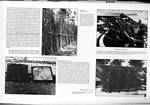 |
AUSCHWITZ:
Technique
and Operation
of
the Gas Chambers © | |
|
| |
 |
Back |
 |
Contents |
Page 501 |
 |
Home
Page |
Forward |
 |
| |
| one after the other after the pits came into operation. The
first to be stopped was Krematorium IV, apparently in June 1944
[this date may seem early. but reference to other accounts where
this type of mformtation is given indirectly rather than
explicitly], then in October 1944, I think, Krematorien II and
III. Krematorium V kept going until the Germans fled. Towards
the end, it was used to incinerate the bodies of prisoners who died
naturally or were executed. Gassing ceased in October 1944 [on 26th
November, Himmler ordered the Krematorien to be dismantled, thus
making the end of the gassings officia]. At present, I am incapable
of giving the exact number of all the people gassed and incinerated
in the Krematorien and the pits. Some of the men working in the
Krematorium noted individually and in secret the figures and the
most dramatic events concerning the gassed persons. These notes were
buried in different places close to the Krematorien. Some were dug
up during the stay of the Soviet Commission [February – March 1945]
and the Soviets took them away. Most of the notes must still he
buried and it should be possible to retrieve them. There were, among
other things, photographs of people gassed in the gas chamber and
others of convoys arriving at the Krematorium to he gassed
[never found]. I imagine that during the period in which I worked in
the Krematorien as a member of the Sonderkommando, a total of about
2 million people were gassed. During my time in Auschwitz, I was
able to talk to various prisoners who had worked in the Krematorien
and the Bunkers before my arrival. They told me that I was not among
the first to do this work, and that before I came another 2 million
people had already been gassed in Bunkers 1 and 2 and Krematorium I.
Adding up, the total number of people gassed in Auschwitz amounted
to about 4 million. |
| |
[A propaganda figure. become symbolic. We find the
same type of response in the deposition by Szlama Dragan on 17th
May 1945. where he says in similar terms: “I am unable to say the
|
|
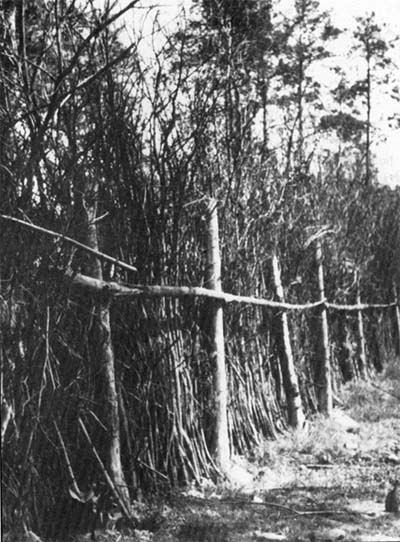 |
Document
46
[PMO neg. no. 860]
Remains of
a hedge hiding the south yard of Krematorium V and bordering the
“Ringstraße / ring road” of the camp.as found at the liberation. The
hedge has since been removed. It was said to be 3 metres high, but
this figure seems to be exaggerated in view of the position of the
camera. quite close to the ground. In the background are some of the
trees hiding the south side of Krematorium V. |
|
| Document 47 |
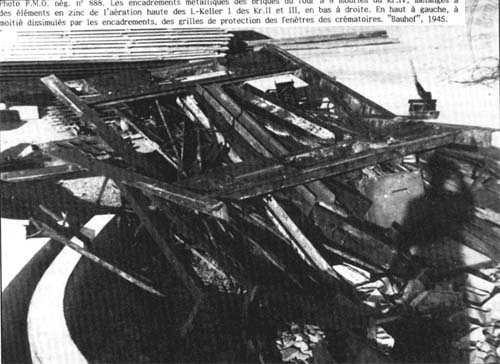 |
|
| |
Document 47:
[PMO neg. no.888] |
| |
|
| |
The metal frame of the
Krematorium IV 8-muffle furnace, mixed up with zinc covers from the
upper ventilation holes of Leichenkeller 1 of Krematorien II and
III, lower right. Upper left, half hidden by the frame components,
are protective grids from the Krematorium windows. Photograph taken
in the Bauhof (building materials yard) in 1945. |
|
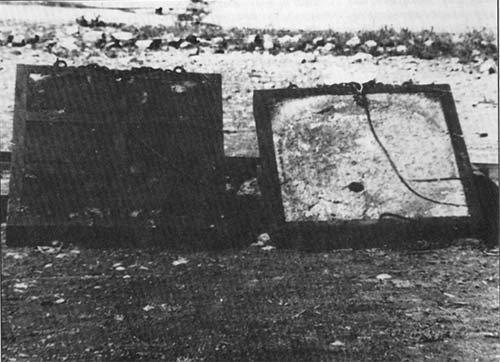 |
Document
48 |
|
Document 48:
[PMO neg, no.
887] |
|
|
|
| Doors of the Krematorium IV furnace. They are vertically
sliding, “guillotine” doors with inspection peepholes from the
muffles of the Krematorium IV cremation furnaces (those of Kr V were
identical), photographed at the Bauhof in 1945. The Auschwitz
Bauleitung requests to foreman Koch of Tupf & Sons to make 8
counterweights and modify several pulleys for the Krematorien IV and
V furnaces (“metalworking” file of volume 11 of the Hoess trial,
order nos 137 and 175) indicate that of the 10 “Handwinden / hand
winches” fitted — without any indication of their location or
function — in the furnace room of Krematorium IV (PMO file BW
30/43. page 33), 8 were destined for the double 4-muffle
furnace, known as the 8-muffle furnace, and 2 for the smoke flue
dampers. Topf drawing D.58173 for a single muffle furnace for
Mauthausen concentration camp (Bundesarchiv Koblenz, NS 4
Mauthausen/54) clearly shows the opening and closing technique for
an incineration muffle in Krematoieb IV and V as being by an
“Absperrschieber(tür) / sliding shut-off door” with a housing
projecting from the upper part of the furnace (visible on the
cross-section of the furnace on drawings 1678 and 2036 of
Krematorium IV) to hold the door when in the upper position, i.e
when the muffle was open. Thus the muffle doors of Krematorien IV
and V opened vertically, while those of II and III were ordinary
hinged doors. These winches, counterweights and doors are now stored
in the former coke store of Krematurium I in the main
camp. |
|
| |
Document 49
[PMO neg. no. 889]
Protective grids from the
Krematorium windows, photographed in the Bauhof in 1945. |
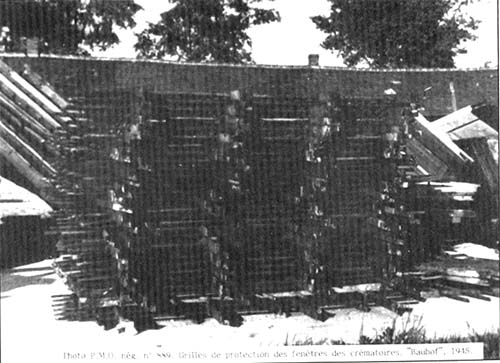 | |
| |
AUSCHWITZ:
Technique
and operation
of the gas chambers
Jean-Claude Pressac
© 1989, The
Beate Klarsfeld Foundation |
 |
Back |
Page 501 |
Forward |
 |
|

